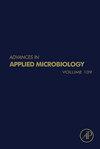嗜热菌CRISPR/Cas基因组编辑系统:现状、相关挑战和未来展望
2区 生物学
Q1 Immunology and Microbiology
引用次数: 2
摘要
嗜热菌为生物燃料和环境保护的广泛应用提供了一个有吸引力和独特的平台,受到了学术界和工业界的极大关注和日益增长的兴趣。然而,由于缺乏强大的基因组操作工具来提高生产效率,对嗜热生物的探索和开发一直受到阻碍。目前,聚集的规则间隔短回文重复序列(CRISPR)/CRISPR相关(Cas)系统已经成功地作为一种有效的、简单的、强大的工具在真核生物和原核生物中进行基因组工程。事实上,随着近年来的巨大努力,一些耐热性Cas9蛋白已经被很好地鉴定和表征,并且一些基于耐热性Cas9的编辑工具已经成功地在一些代表性的专性嗜热细菌中建立起来。在这方面,我们综述了基于CRISPR/ cas的基因组编辑系统对多种嗜热生物的研究现状及进展。尽管这些进展具有潜力,但仍需要克服和优化多个因素/障碍,以提高其在嗜热菌中的编辑效率。对热稳定性CRISPR/Cas技术作为嗜热微生物细胞工厂在嗜热菌代谢工程中的作用进行了充分的分析和讨论。本文章由计算机程序翻译,如有差异,请以英文原文为准。
CRISPR/Cas genome editing systems in thermophiles: Current status, associated challenges, and future perspectives.
Thermophiles, offering an attractive and unique platform for a broad range of applications in biofuels and environment protections, have received a significant attention and growing interest from academy and industry. However, the exploration and exploitation of thermophilic organisms have been hampered by the lack of a powerful genome manipulation tool to improve production efficiency. At current, the clustered Regularly Interspaced Short Palindromic Repeat (CRISPR)/CRISPR associated (Cas) system has been successfully exploited as a competent, simplistic, and powerful tool for genome engineering both in eukaryotes and prokaryotes. Indeed, with the significant efforts made in recent years, some thermostable Cas9 proteins have been well identified and characterized and further, some thermostable Cas9-based editing tools have been successfully established in some representative obligate thermophiles. In this regard, we reviewed the current status and its progress in CRISPR/Cas-based genome editing system towards a variety of thermophilic organisms. Despite the potentials of these progresses, multiple factors/barriers still have to be overcome and optimized for improving its editing efficiency in thermophiles. Some insights into the roles of thermostable CRISPR/Cas technologies for the metabolic engineering of thermophiles as a thermophilic microbial cell factory were also fully analyzed and discussed.
求助全文
通过发布文献求助,成功后即可免费获取论文全文。
去求助
来源期刊

Advances in applied microbiology
生物-生物工程与应用微生物
CiteScore
8.20
自引率
0.00%
发文量
16
审稿时长
>12 weeks
期刊介绍:
Advances in Applied Microbiology offers intensive reviews of the latest techniques and discoveries in this rapidly moving field. The editors are recognized experts and the format is comprehensive and instructive.
Published since 1959, Advances in Applied Microbiology continues to be one of the most widely read and authoritative review sources in microbiology.
Recent areas covered include bacterial diversity in the human gut, protozoan grazing of freshwater biofilms, metals in yeast fermentation processes and the interpretation of host-pathogen dialogue through microarrays.
 求助内容:
求助内容: 应助结果提醒方式:
应助结果提醒方式:


